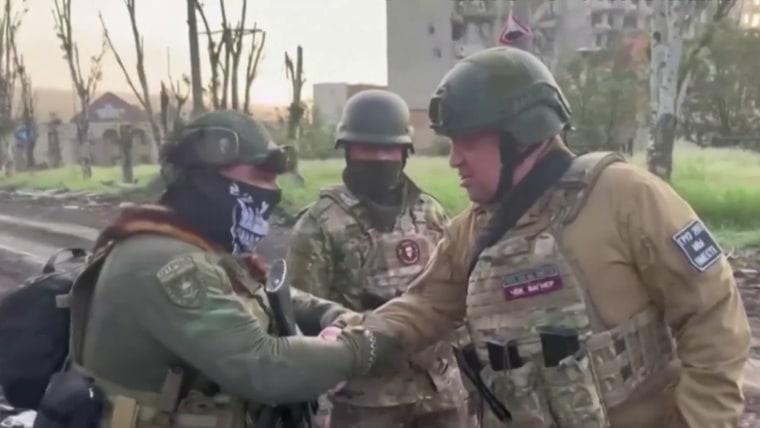[ad_1]
‘Who can Putin trust?’
This is new ground for Putin’s Russia, until now only troubled by the occasional unarmed protest swiftly crushed by police. By contrast, in a few short hours, Yevgeny Prigozhin’s Wagner mutineers were able to overrun a key Russian city, shoot down several military aircraft, and leave the Kremlin scrambling to defend the capital.
The few Russian troops not deployed in Ukraine were seemingly unable or unwilling to thwart Prigozhin’s advance, with his fighters even cheered by some locals.
The revolt’s abrupt resolution may only add to the questions now hanging over the Kremlin, not least because of Putin’s apparent willingness to pardon Prigozhin — sending him to Belarus and dropping charges against his fighters — just hours after accusing him of stabbing Russia in the back.
The situation that unfolded in Russia over the past 24 hours was the most dramatic political development to take place in decades. It was the kind of sudden crisis that at one stage looked like evoking the collapse of the Soviet Union in 1991, and the 1993 constitutional crisis that saw troops loyal to then-President Boris Yeltsin fire tank shells at the offices of parliament.
Prigozhin called it a “rebellion” against Russia’s defense ministry, led by his rival Sergei Shoigu. The mercenary chief was careful not to criticize Putin, but his advance was a clear threat to the president, who denounced it as such and vowed to “neutralize” the uprising.
While this was playing out, a senior American military official told NBC News it was “a very dangerous time” and “it all depends on how the military acts — the next 72 hours are critical.” The best way to see what happened is like an attempted mafia takeover, the official said, with a loyal soldier who has risen through the ranks seeking more power for himself.
In the event, the mercenaries got within 125 miles of Moscow before making the shock announcement that they were turning back.
But this maverick act of revolt from one of Putin’s former close allies has presented Russians with an alternative narrative for the war in Ukraine and a glimpse at the weakness of the state.
Prigozhin preceded his advance on Moscow with public defiance of Kremlin propaganda, denouncing the invasion as an unjustified attempt by elites to plunder Ukraine’s material assets — resulting in the needless deaths of untold thousands of Russians.
The Russian people, its military and elites will not forget Prigozhin’s searing criticisms, much less the vulnerabilities his uprising exposed. “What’s done cannot be undone,” as the Washington think tank the Atlantic Council said in a briefing.
It also raises uncomfortable questions for the authoritarian leader: Put simply, “Who can Putin trust?”said Lt. Gen. Ben Hodges, the former commander of the U.S. Army in Europe.
With such a schism exposed at the heart of the world’s most well-stocked nuclear power, the West will also be trying to work out how to respond to this new era of Russian instability.
The United States and its allies “must recalculate its assessment of Putin’s actual power and strength within Russia and his willingness and ability to use nuclear weapons,” Hodges said. “Clearly he cannot count on the loyalty of all of his officers,” he added, given the apparent lack of foresight and pushback from Russia’s intelligence and security services respectively.
[ad_2]
Source link

